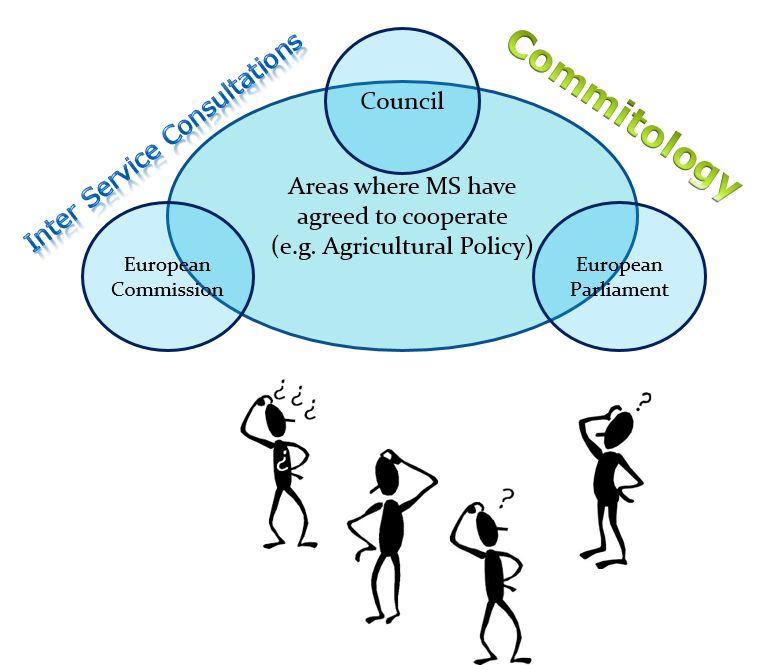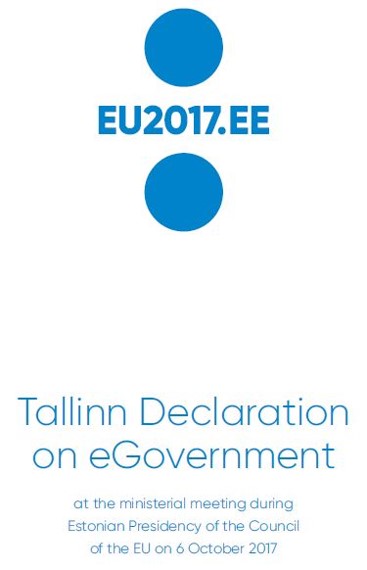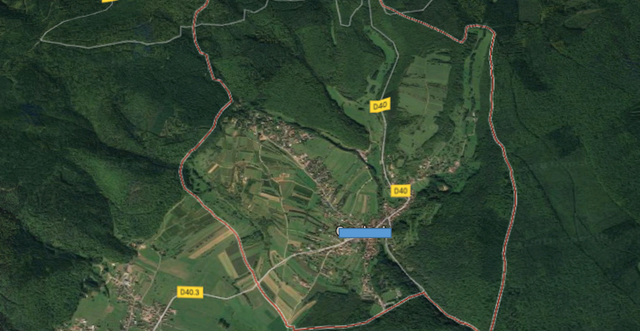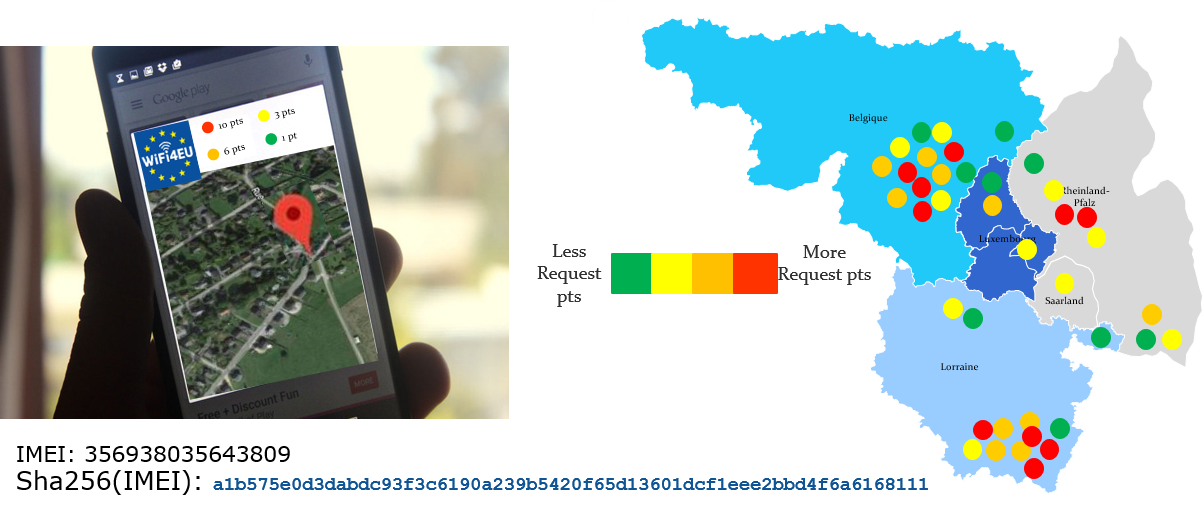Toward a pan-EU blockchain infrastructure
The information I present here reflects my personal views and does not represent the official opinion of the European Union nor the European Commission.
The European Commission
First, a few words about the European Commission. It has two main "core-missions"
- Initiate legislation (regulations, directives, etc.)
- Fund the priorities agreed upon by the Council of the EU (thereafter "Council" in short) and the European Parliament (thereafter EP)
Legislative activity
Although to an uninformed eye it might look like the Commission initiates legislation "out of the blue", this is very far from the truth. The legislative process is so complex that no one in his right mind would start if it didn't have a pretty high number of allies in the other political bodies, and a good chance to succeed. In truth, a loose agreement about the need to legislate at the European level is reached way ahead of the Commission putting a draft legal act through the grinder.
When that process starts, it is by force a mind-boggingly complex choreography involving outside experts, NGOs and lobbyists from the 28 Member States, all with their own agendas, under a process called "comitology"; the Council and the EP as well as the consultative bodies "Committee of the Regions" and the Economic and Social Committee. I oversimplify to avoid readers falling asleep.
Despite what conspiracy theorists would have you believe, this is not the result of deliberate obfuscation but simply the first "Nash equilibrium" that the Member States (MS) have managed to reach. Crafting legislation that suits 28 member states as different from one another as the EU member states is bound to be extremly difficult and complex. That a very delicate balance manages to be reached sometimes is close to a miracle.
Could it have been more transparent, less complex? Well, assuming you start again, using humans (i.e. mere mortals) I strongly doubt it.
Funding commonly-agreed political priorities
A picture speaks a thousand words. Here a much simplified schema of the process through which the Commission funds projects (image coming from the European Court of Auditors). Again, this is not complicated on purpose, but that doesn't make complexity desirable. It is an unfortunate but inavoidable side-effect of having to coordinate expenditures over so many layers of decision (including the national and local levels)
The Big Question
How could the Commission be closer to the EU citizens?
This is not a question that I alone am asking. It appears clearly from the recent "Tallinn declaration on eGovernment" that was fittingly brokered by Estonia, possibly the most high-tech of the EU member states, during its presidency of the Council.
In it the EU, through its governments and institutions, including the Commission, openly state that they are on a quest to come closer to the citizens, to serve the citizens better, to be more "citizen centric". The governments of the EU commit to open, inclusive, borderless, user-friendly, end-to-end digital public services to all citizens and businesses.
They talk about "digital by default", about the objective of allowing the citizens to interact digitally with public administration. And they commit to the principle of user-centricity for design and delivery of public services
Blockchain and the European Commission
As it happens, incentive alignment is the biggest challenge to effective and efficient policies.
- Citizens cannot easily give feed-back to lawmakers on legislation
- The EC has few easy ways to measure the actual impact of the funds it disburses
These difficulties ultimately erode trust in government. The importance of which has been asserted in the Tallinn declaration:
We believe blockchain technology will allow the EC to make credible commitments to the EU citizens. And to illustrate what I mean by that, I'll take the example of the "WiFi 4 EU" policy, put forward by President Juncker during the "State of the Union" address of 2016
"... we propose today to equip every European village and every city with free wireless internet access around the main centers of public life by 2020."
This is obviously a costly policy and the money to deploy it will be made available gradually. There is a clear imperative to make sure that wherever money is deployed, it responds to a real need for internet connectivity because the free market has failed to provide it - typically in "digital deserts", digitally-deprived areas often located in mountainous areas. Such an area might look like this (Google Maps satellite image):
Questions about the efficiency of digital policies
How to ensure that the WiFi4EU equipment is deployed where it is most needed? That the money is allocated with priority to provide Wi-Fi connectivity where no or few other options are available to connect to the internet? That the process is as transparent and fair as possible?
Blockchain answer:
Engage directly with the citizens! Ask them to "vote" for the spots that should be equipped with free WiFi with priority. This could be brought about by engaging and empowering the citizens.
The EU citizens could thus be offered an app which, upon installation (presumably when the user finds himself in an area with internet connectivity), would associate a number of "votes" ("request points") with the hash of the device's IMEI (or the IMEI+ Sim card's PUK for even greater anonimity). The citizen would then be able to allocate those "request points" to wherever he would like the EC to pay a supplier to install a WiFi hotspot.
The data could then be aggregated and displayed as a "heat map" over the map of the EU. Based on that information, the communes that will receive funds to get equiped will be ranked according to the directly-expressed will of the EU citizens - those for whom this policy is ultimately intended.
A pan European blockchain infrastructure could spring into existence by inviting every willing EU citizen (on a voluntary basis) to run an EU-blockchain node, knowing that the blockchain is secure and saving set-up and operation costs for the EC. In turn, the EC would benefit from resilience thanks to a wide distribution of nodes and would generate trust in the outcome through the transparency and immutability of the blockchain-recorded data.
The people running the blockchain nodes will probably be more tech-savvy and located in areas with good internet connectivity, thus likely disjoint from those using the app to vote to request the installation of WiFi4EU hotspots. In time such an infrastructure could find an utility in other situations where a quick pan-EU consultation might provide direct insights from the citizens.
Questions about the effectiveness of digital policies
How could the EC check the effectiveness of digital policies - such as in this example, WiFi 4 EU ? How to fight potential fraud? Here are some more detailed questions we would like to have answered:
- "Are the WiFi4EU hotspots still in place and working after the supplier has received payment?"
- "Is the connection quality (bandwidth, latency, etc.) in line with what the supplier has committed to in the contract?"
- "Are actual connections over the installed hotspots being established and used by the citizens?"
Blockchain answer
Compare connection data from the citizens' devices to data sent by the hotspots themselves!
- Functioning of the hotspots can be monitored over a longer period (no more "unscrew the WiFi routers after pocketing the money and sell them again")
- Data about established connections sent by hotspots can be reconciled with data sent by the phones of the EU citizens for whose benefit the policy was devised (no more "hotspots are there, money has been disbursed but the connection is so lousy that no one uses it")
- Quality can be monitored across Europe in a harmonized way (if the service offered is not in the parameters to which the contractor has committed to, proportionally less money is paid to him)
- Payment of the supplier can be linked to the outcome (configurable rules: how many concurrent connections, how much data transferred, etc.)
Conclusion
The use of blockchain technologies can reinforce trust in government and generate a virtuous circle of engagement between citizens and the EU. Blockchain technologies could allow the EC to:
- Easily consult the citizens whenever needed
- Make credible commitments and promises to the citizens
Moreover, they could allow the EC to directly check the effectiveness of certain digital policies, by enabling:










Excellent post! As I have said many times, I think that blockchain technology will revolutionize the world at least as much as the Industrial Revolution did. Your post merely confirms that we are more people who think this.
What we need to pay attention to, though, is the "counter-revolution" that will no doubt come at some point. We are living in interesting times indeed :-)
It's very likely to be how you say! At least that's what history tells us.
All the above are based on the mass-adoption of the blockchain (in general) and individual responsibility. I’m only trying to imagine implementing blockchain in some of Romania rural areas :) good luck with that.
Thanks for sharing some real content and info about the machine that EC is.
I probably need to explain it more clearly. Indeed my bad, I've mixed a bit the "consumer" part with the "provider" part.
In most of the above EU citizens need not bother with anything blockchain! It's about "consuming" digital services. No need at all to even hear the word "blockchain" being pronounced !
There are two practical use-cases being set up on top of an actual policy (that really exists).
The first use-case is "EC gives money to install free WiFi hotspots. Where do you, EU citizens, want them installed? To answer the question, download an app, open it up, zoom in the map and pick X (e.g. X=4) points on the map where YOU think a WiFi hotspot would be useful - in your village, in front of your house, etc."
That is all that's requested to "consume" the service offered!
As you can see from this description, no EU citizen needs to know that behind the scenes, the back-end system collecting the potentially millions or even tens of millions of anonymous "voting" messages is a blockchain system ! All they need to know is that there's an app to download and install on their smartphone, open it up, zoom in a map and put their fingers on 2-3-4 points where they would like to have a free WiFi hotspot installed (by a telecom company, with EU money)
The second use-case is purely internal to the way the EC funding machine works. Today it is mostly based on paper and "declarations of conformity". Here the proposal is to do away with "humans signing papers and sending them to be verified and filed by the EC" and replace that antiquated verification system with direct on-chain verification of actual WiFi connections. This would be done by the EC systems because it is the EC who pays and who wants to prevent the telecom companies installing the WiFi hotspots from scrounging, doing shoddy work, installing poor quality equipment that is not usable, etc, etc.
Now in the "provider" part - that gives the title to the post, the "pan-EU blockchain infrastructure", the volunteers involved will probably be more technology-inclined than the average population.
But there's no need for the blockchain to be run by a lot of people either - a "normal size" one like Steem is ok, we don't need the number of nodes of ethereum or bitcoin
Thank you for the details. So if I get it right this time... practically EC is looking into ways to use smart contracts. The final product of this use may be a sort of voting method (user friendly) and of controlling the internal machinatios and proceedures needed to control and manage the expenses.
Precisely ! Thank you for your feed-back, it tends to indicate that I manage to explain it more clearly in the end ! :)
Congratulations on exhaustively presenting this subject!
I am at least a bit skeptical though. Politicians think of citizens when elections come, and they do, in 2019.
That is only normal. We are all people, and people respond to incentives. That is neither good nor bad, it is just the way it is. We publish on Steemit rather than somewhere else because here we get STEEM ! In exactly the same way politicians are motivated and incentivized by the elections. Nothing nefarious in that, as long as promises made before the elections are being kept afterwards!
And here it is where the blockchain can bring a lot: if the promise is written in a smart-contract visible by everyone on the blockchain, they'll think twice or three times as hard before breaking it ... and maybe finally decide that the cost to their reputation of breaking such an explicit promise is too big to be acceptable.
Blockchain has the potential to reduce the political "fudge" and "double speak". At worst, it might not change much. But at best, it can completely revolutionize politics
You are right about incentives, we all pay attention to them in some ways.
I think politicians will change when their audience, the citizens, will.
It is more likely that blockchain will succeed by generating change from the bottom up, and not the other way around.
You got a 1.62% upvote from @postpromoter courtesy of @sorin.cristescu!
Want to promote your posts too? Check out the Steem Bot Tracker website for more info. If you would like to support the development of @postpromoter and the bot tracker please vote for @yabapmatt for witness!
You got a 1.65% upvote from @buildawhale courtesy of @sorin.cristescu!
If you believe this post is spam or abuse, please report it to our Discord #abuse channel.
If you want to support our Curation Digest or our Spam & Abuse prevention efforts, please vote @themarkymark as witness.
You got a 16.34% upvote from @upmewhale courtesy of @sorin.cristescu! Earn 90% daily earning payout by delegating SP to @upmewhale.
8.55% @pushup from @sorin.cristescu
This post has received gratitude of 1.75% from @appreciator courtesy of @sorin.cristescu!
@trufflepig
Thanks for calling @sorin.cristescu! Here is a small upvote for this post and my opinion about it.
To my mind this post is at least 7 SBD worth and should receive 28 votes.
By the way, you can find TODAY'S TRUFFLE PICKS HERE.
I am
TrufflePig, an Artificial Intelligence Bot that helps minnows and content curators using Machine Learning. If you are curious how I evaluate content, you can find an explanation here!Have a nice day and sincerely yours,

TrufflePigThank you, TrufflePig Now that I know (from the comments section of a previous post) that the median payout for an article is $0.1 (and the average $6) I know that I was right to use bots to promote this post to the attention of the readers :-)
@originalworks